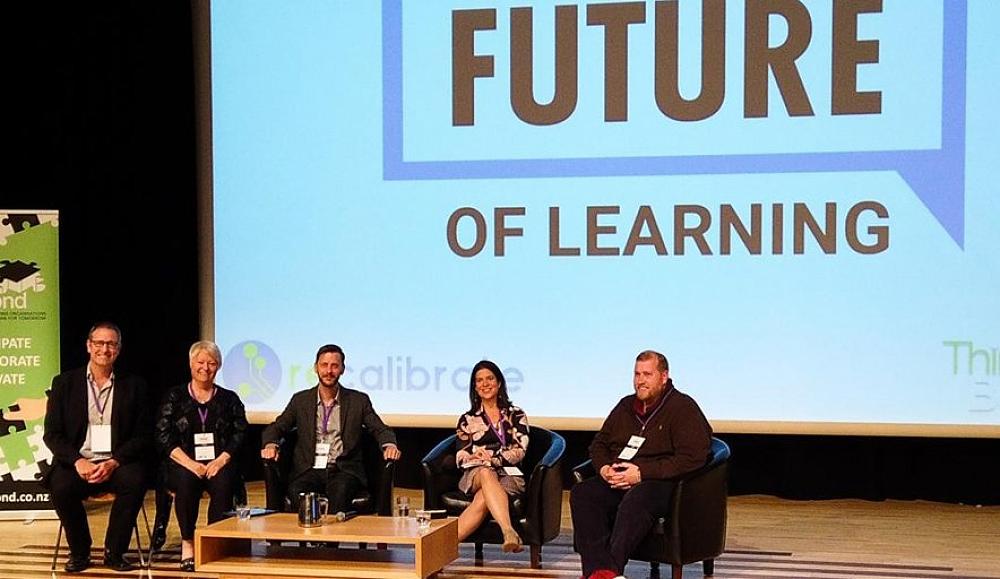
Flexibility in Secondary Learning, Students leading their own learning
Student to student interaction is becoming more prevalent. While there are still students that spend most of their school day working alone there are increasing examples of students collaborating in groups; working in self-paced, self-directed ways; or having greater flexibility in their interactions. The Riccarton High School Media and Advertising programme is an elective for Years 11-13 students, with a focus on developing skills through communicating with community. This student driven programme has students creating content for many different communication pathways including newsletter, website, billboard, video, Facebook, snapchat and Instagram.
Dr Chris Jansen from the Leadership Lab and Dr Cheryl Doig from Think Beyond explore the way learning in secondary education is currently delivered in order to better equip students for the future they will find themselves in.
All of us as parents want the best for our children, especially as they leave home and create their own future. This includes not only their future work but also their social and community connections and well-being in general. Understandably we, as parents, are very interested in and sometimes quite anxious about how our schools best prepare our young ones for that future.
We would probably all agree that our young people’s futures will have significant differences from our own lives. The local and global communities and economies that they will live in will face increasing volatility, uncertainty, complexity and ambiguity and their future work will undoubtedly be different from what we have experienced. They will likely embrace multiple vocation pathways, portfolio careers and ongoing micro-learning. New jobs will be created, and routine jobs will be replaced by technology. Exponential technologies such as artificial intelligence will create some new learning opportunities and pose some risks.
These uncertain and ambiguous contexts will require our young people to excel in what is often described in schools as the 21st century skills. Skills such as self-management, collaboration, creativity and resilience in parallel with the knowledge acquisition that has always been a focus of secondary education.
There is a clear rationale that we need to evolve the way we deliver secondary education in order to more intentionally develop these future-focused skills. However, there is huge diversity and debate in how this might be achieved and what this might look like. For many years the majority of secondary schools have adopted a model of learning extremely similar to each other; one focused predominantly on knowledge acquisition. The secondary learning approach that we experienced ourselves probably included groups of 25 to 30 students of similar age learning in a single subject/curriculum area for 50–60-minute periods that are repeated five to seven times per day. Although this model is very prevalent it has also been heavily criticised over the years with many schools both locally and globally choosing to design different approaches to learning.
However, we have noticed with concern that the secondary sector is becoming polarised in the media, in some parent communities and amongst educators themselves. This polarisation compares secondary schools who appear to have opted to maintain a more ‘traditional/standard’ model and the schools that appear to have more flexible approaches. This polarisation has created an unhelpful media perspective that schools have just two choices; to either maintain a ‘traditional’ approach or adopt a ‘radical’ one. However, this perceived polarisation is not the reality. Almost all secondary schools across New Zealand are exploring future-focused learning through trialing more flexible approaches to learning with small and large initiatives ‘bubbling away’, focusing on better meeting the needs of students.
Dr Chris Jansen is a director and senior consultant with Leadership Lab and works alongside organisations in the education, health, business and community sectors on a range of projects. Chris is also a senior lecturer at the University of Canterbury, where he teaches the Master of Business Administration and Postgraduate Diploma of Strategic Leadership.
Dr Cheryl Doig is a leadership futurist who follows leadership trends and research and translates these into practice, working internationally and virtually with organisations, business leaders and educators. Her passion is for challenging organisations to think differently in order to adapt to a changing future – to think beyond their current leadership realities, while still using the best of the past.
Stay tuned - in the next issue we look at how local secondary schools are road-testing thoughtful and credible flexible approaches to learning by adapting the way they organise students, teaching spaces, learning interaction curriculum and assessment.
